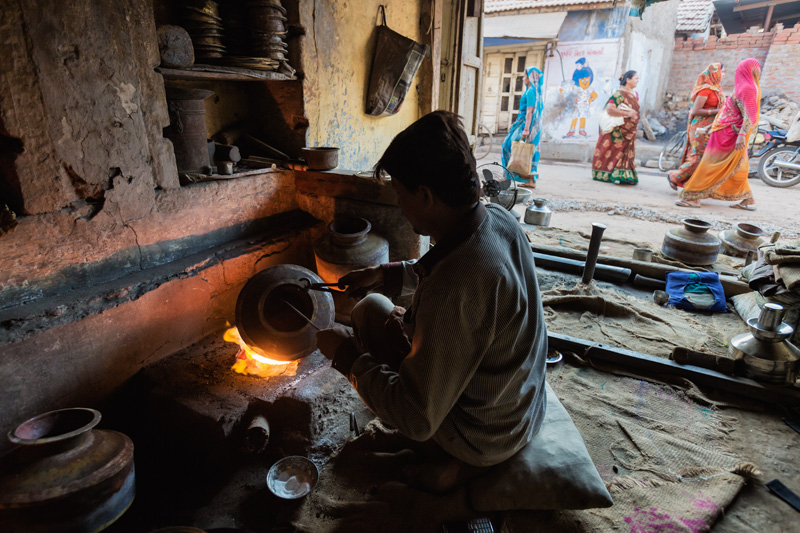I am not fully versed in all of Gandhi's teachings and philosophies but have read of his love for rural village life and his hope that these simple, unelectrified places would be the driving force in his emerging nation. Uneducated villagers working their looms, making kitchen utensils and plowing their fields have been evident to our group over the course of the past 12 days. Spending an afternoon photographing in Wadhwan was a unique experience for all.
As we exited our cars we could hear the rhythmic banging of hammer on brass and copper. The long, narrow main street had stalls selling everything from A to Zed as one storekeeper told us with a gentle bob of his head. The omni present barber shops charging 30 - 50 rupees (less than $1 USD) were occupied by men chatting away in Hindi and a dialect that I was told was full of slang, metaphor, and phrases based on agrarian life. The walls were adorned with calendars with their favorite Baba's.
Living in a consumer oriented society where everything is massed produced and machines do the work of people it was amazing to see these men at work.I photographed copper sheets being transformed into drinking cups, heavy brass bowls being shaped and then placed into small fire pits. All would soon be bought by itinerant sellers and sold all over Gujarat.Many would beused to collect buffalo milk. These men were not wearing masks, and the fumes irritated the eyes of many in the group, and is was a surreal scene as these small workshops found all over Wadhwan turned raw material into a usable product. These guys receive a salary of about $110 per month for their long days. I am not so sure that Gandhi would approve of these sweat shop conditions!
As we exited our cars we could hear the rhythmic banging of hammer on brass and copper. The long, narrow main street had stalls selling everything from A to Zed as one storekeeper told us with a gentle bob of his head. The omni present barber shops charging 30 - 50 rupees (less than $1 USD) were occupied by men chatting away in Hindi and a dialect that I was told was full of slang, metaphor, and phrases based on agrarian life. The walls were adorned with calendars with their favorite Baba's.
Living in a consumer oriented society where everything is massed produced and machines do the work of people it was amazing to see these men at work.I photographed copper sheets being transformed into drinking cups, heavy brass bowls being shaped and then placed into small fire pits. All would soon be bought by itinerant sellers and sold all over Gujarat.Many would beused to collect buffalo milk. These men were not wearing masks, and the fumes irritated the eyes of many in the group, and is was a surreal scene as these small workshops found all over Wadhwan turned raw material into a usable product. These guys receive a salary of about $110 per month for their long days. I am not so sure that Gandhi would approve of these sweat shop conditions!


 RSS Feed
RSS Feed